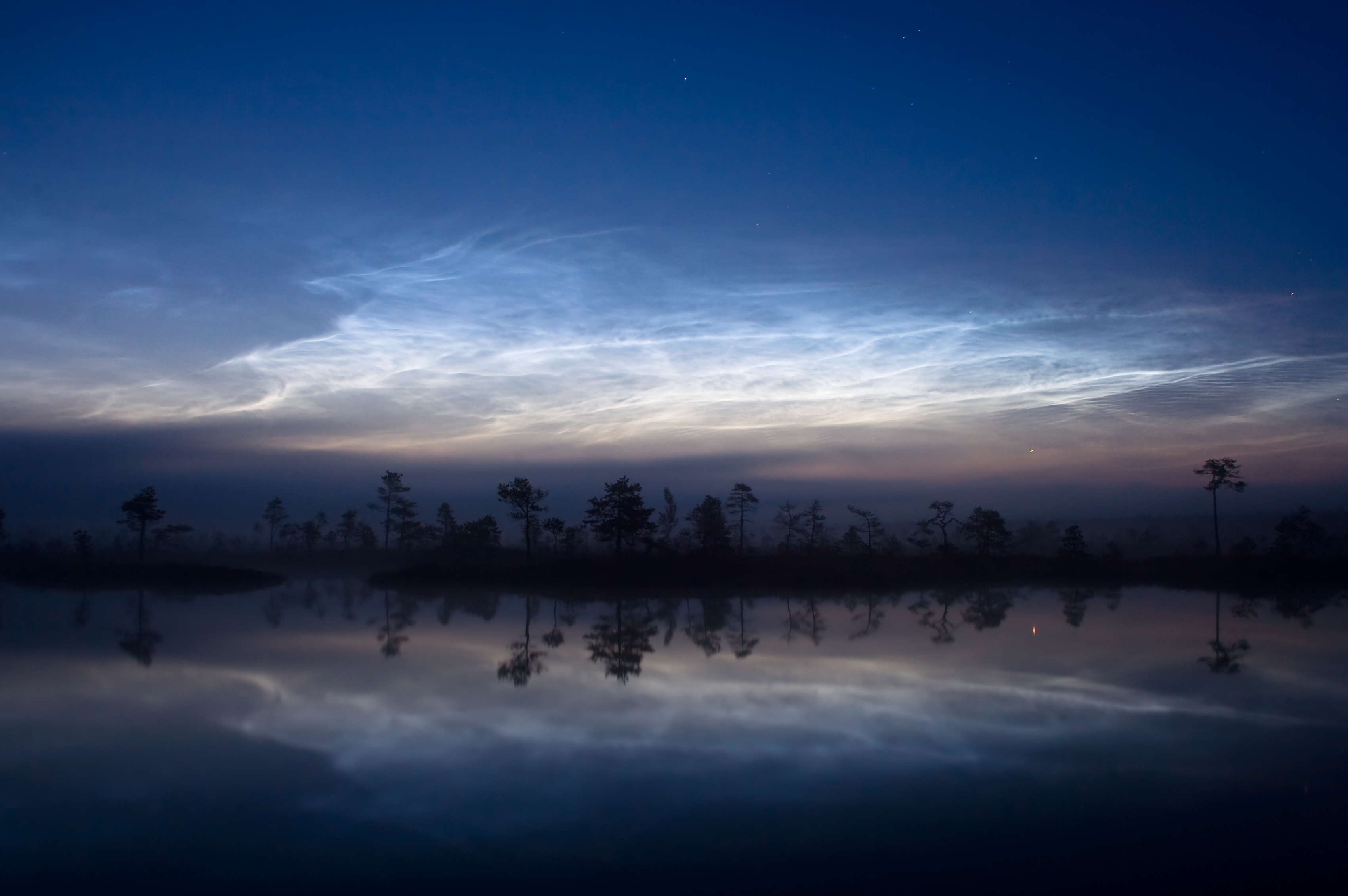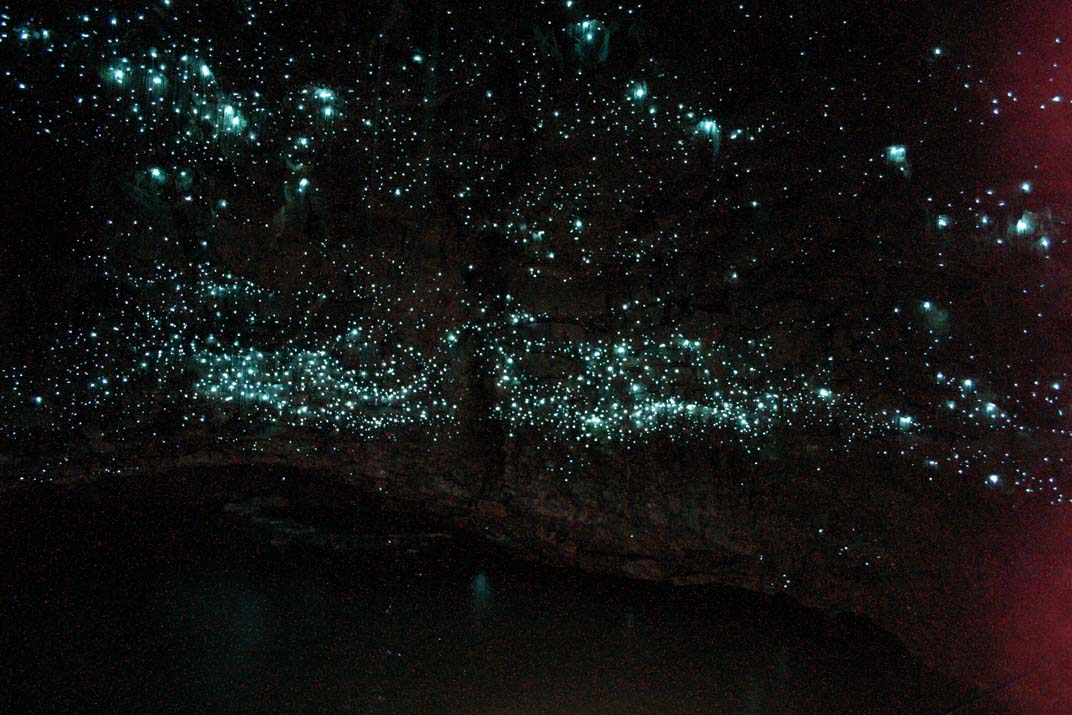.

Noctilucent clouds, Kuresoo bog, Soomaa National Park, Estonia: photo by Martin Koitmäe, 2009
I
Ye Living Lamps, by whose dear light
The Nightingale does sit so late,
And studying all the Summer-night,
Her matchless Songs does meditate;

Female Glow Worm (Lampyris noctiluca) in field grass, Princes Risborough, Bucks.: photo by Timo Newton-Syms, 2007
II
Ye Country Comets, that portend
No War, nor Prince’s funeral,
Shining unto no higher end
Than to presage the Grasses fall;
Contrail across tail of Comet 2004/F4, seen from Cactus Flats: photo by The Starmon, 2004
III
Ye Glo-worms, whose officious Flame
To wandring Mowers shows the way,
That in the Night have lost their aim,
And after foolish Fires do stray;

Laser beam directed toward the centre of the Milky Way from Yepun laser star guide facility at ESO Paranal Observatory, Chile, crossing the southern sky and creating an artificial star at 90 km. altitude in Earth's mesosphere: photo by ESO/Yuri Beletsky, 2010
IV
Your courteous Lights in vain you wast,
Since Juliana here is come,
For She my Mind hath so displac’d
That I shall never find my home.

Glow-worm heaven [Lampyris noctiluca swarm], Waitomo Caves, Waitako, New Zealand: photo by milkthebasic, 23 October 2006
for Don
Andrew Marvell: The Mower to the Glo-worms, summer 1650 or summer 1651, posthumously published in Miscellaneous Poems, 1681
for Don
Andrew Marvell: The Mower to the Glo-worms, summer 1650 or summer 1651, posthumously published in Miscellaneous Poems, 1681
Andrew, in case people haven't noticed, is no stranger hereabouts, enigmatic and secretive fellow though he will (happily) always remain. The greatest poet in English in my view, looking down from the Milky Way upon us at this moment with a gentle, lip curled, one-eye-ever-so-slightly cocked yet permissive sneer of disdain. Probably more than we deserve, when you think of it.
ReplyDeleteAndrew Marvell: Damon the Mower
Andrew Marvell: By the River Wharfe
Andrew Marvell: The Definition of Love
Andrew Marvell: The Mower to the Glo-Worms
Andrew Marvell: The Wars and Fortunes Son: Cromwell's Coup d'État
'Tis sweet to recall, here on yet another very cold, not-quite springtime-in-Northern California morning, that there exist such wondrous things in the world as fireflies and summer nights. Our good friend Don Wentworth of Issa's Untidy Hut has helpfully reminded me of this.
This is my favourite firefly poem, at once an exquisite miniature and a "real" poem, big with implications concerning nature and history, bearing a delicate implicit and oblique but still perceptible relation to the symbolic loss of an island Eden in the wreckage of the English Civil Wars.
"Marvell was at home in small poems," writes Barbara Everett. "'The Mower to the Glo-worms' imparts a sense of a lost paradise -- irretrievably, if in the end lightly lost -- not qualitatively less deep than any comparable moment in Milton."
Beautiful, Tom - the photography is stunning, such a fine setting for, as you say, a real poem, an exquisite miniature, thanks for sharing it here and also with the folks at the Hut ...
ReplyDeleteI believe I will be contemplating this poem for quite sometime ... and cherishing it.
Don
Tom,
ReplyDeleteAh Andrew (I mean Tom), beautiful poem and photos -- "The Mower to the Glo-Worms" read here, w/ these visual counterparts (echoes) as if for the first time. . . .
4.28
light coming into clouds above shadowed
ridge, unseen robin calling from branch
in foreground, sound of wave in channel
related painting, must have
been made on the spot
it from it, that is from it,
will appear itself as
silver of sunlight reflected in channel,
white cloud in pale blue sky on horizon
Don,
ReplyDeleteThanks again for putting me in mind of this. It's a poem I always "see", in my mind, as well as of course hear and feel and think-through. Getting a bit of a jump on summer and the nightingales can never hurt. I hope I am not undreaming when I say the sun has appeared here this morning. Now that's a rare bit of luck.
Steve, light actually coming through the clouds and the tree branches in an almost can it really be spring-ish sort of way this morning here, too.
Looking forward to the matchless meditative songs of our summer nights... along about, when, mid-October?
Thank you, Tom. Marvelous (no, not a pun) to see these this morning, after Tuscaloosa, before surgery in the morning, knowing the glow worms will still glow, Marvell will still strum the chords, all of them.
ReplyDeleteThis is really wonderful to read at the end of a long, trying and actually quite warm day. (Not complaining about the weather.)
ReplyDeleteYe Country Comets, that portend
No War, nor Prince’s funeral,
Shining unto no higher end
Than to presage the Grasses fall;
These lines are wonderful.
Now that I've had the mower out, I'm feeling a little concerned about the Glo-Worms, but I would rather be paying attention than not. My computer is completely stuck on signing in as ACravan, but at least I get to read follow-up comments automatically now. Curtis
Charles, thinking of you. I do hope things come out alright.
ReplyDeleteCurtis, and speaking of Princes and Presages:
Signs of the Times: And the Stars Fell on Alabama
Comets were in the Seventeenth Century thought to be signals of impending natural disaster.
ReplyDeletePliny, in his Natural History, pointed out that the grass is cut by mowers in just that season when the glow-worm shines.
Barbara Everett writes of the catalcysmic period of wars and revolution in which Marvell wrote his poetry as "an age in which paradise was never more clearly perceived than at the exact moment at which it ceased to be believed in."
The solemnity of undertone beneath the decorous surface of Marvell's verses bespeaks the tensions of the age, when what was felt by many to be happening was "a deeper war intrinsic to the mere passage of time. The appalling sense of unreality which came to many men like him may explain curious incidents like the ghost-battles in the night sky after Edgehill, when all the sounds of battle were enacted by the shepherds for passers-by... many of Marvell's contemporaries believed deeply that the world was drawing to an end."
Thank you for this ,which adds to my great enjoyment of something I've already enjoyed quite a bit.
ReplyDelete